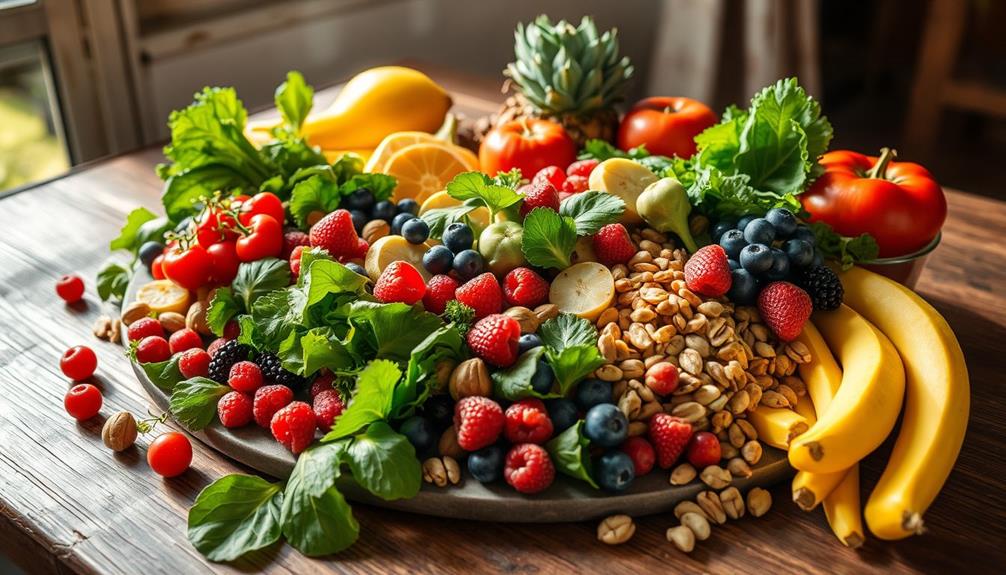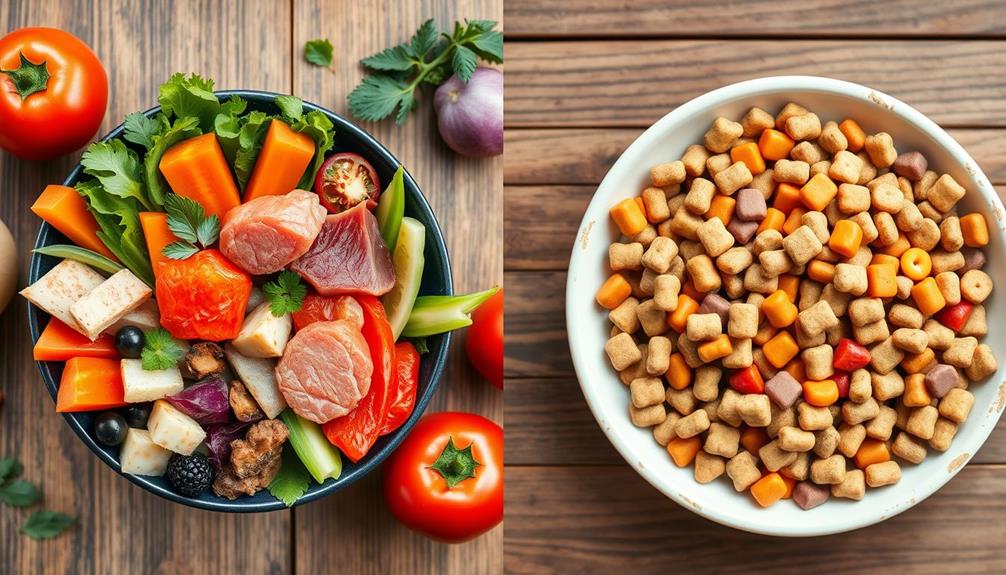A raw food diet focuses on uncooked and unprocessed foods, which can boost your intake of fruits and vegetables. This might help with weight management and provide essential nutrients. However, experts caution that it also poses risks, like nutrient deficiencies in vitamin B12 and iron, since cooked foods often offer better nutrient availability. Additionally, raw animal products can expose you to harmful bacteria. To optimize health, many recommend a balanced diet that includes both raw and cooked foods. Curious about how to achieve that balance? There's much more to explore on this topic.
Key Takeaways
- The raw food diet focuses on uncooked, unprocessed foods, which can increase nutrient intake from fruits and vegetables.
- Nutritional deficiencies, especially vitamin B12 and iron, are significant risks associated with the raw food diet.
- Cooking can enhance nutrient absorption, contradicting the belief that raw foods are always healthier.
- Raw animal products pose safety risks, including exposure to harmful bacteria, which can outweigh potential benefits.
- A balanced approach that includes both raw and cooked foods may optimize overall health and nutrient intake.
Overview of the Raw Food Diet
The raw food diet focuses on eating uncooked and unprocessed foods, which means you'll primarily consume fruits, vegetables, nuts, seeds, and sprouted grains. This approach emphasizes a strict temperature limit of 104–118°F (40–48°C) to preserve essential nutrients and enzymes found in these raw food groups. By sticking to this temperature range, you're aiming to retain the maximum nutritional value of your meals.
It's worth noting that some fruits and vegetables, like cranberry juice, are rich in antioxidants and may offer additional health benefits when included in a raw food regimen.
Preparation methods for the raw food diet include juicing, blending, dehydrating, soaking, and sprouting. These techniques allow you to create diverse and flavorful meals while adhering to the diet's principles. If you're considering this lifestyle, you might notice that it's often associated with veganism or vegetarianism. However, some variations do allow for raw animal products, such as dairy, eggs, and meat.
Many proponents claim the raw food diet offers health benefits, but it's important to approach these claims with a critical eye. While you may experience increased energy levels or improved digestion, scientific evidence supporting these assertions is still limited.
Potential Health Benefits
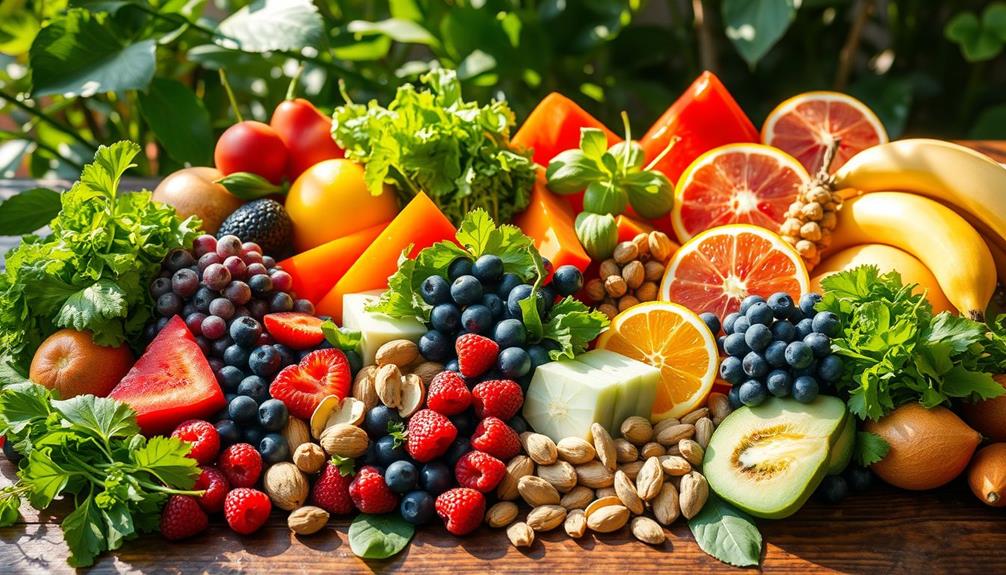
While many people are drawn to the raw food diet for its potential health benefits, it's essential to understand how this approach can positively impact your well-being. Raw food diets are rich in fruits and vegetables, offering an abundance of nutrients like vitamins, minerals, and antioxidants. This nutrient density can enhance your energy levels and improve your skin health.
Additionally, incorporating herbal teas like chamomile and ginger may further support relaxation and alleviate discomfort, complementing the benefits of a raw food diet.
Increased fiber intake from these plant-based foods supports digestive health and promotes satiety, making it easier for you to achieve weight loss. Since fresh produce has a lower calorie density, you can enjoy larger portions without overindulging. Some studies suggest that following a raw food diet may help reduce the risk of chronic diseases, with participants showing lower LDL cholesterol levels and healthier body-mass indices.
Moreover, focusing on whole, unprocessed foods can improve your overall diet quality, as it encourages you to cut back on processed foods. While advocates claim benefits like relief from headaches and allergies, remember that scientific support for these claims remains limited.
Nonetheless, the raw food diet offers promising health benefits that may be worth exploring for your lifestyle.
Nutritional Considerations
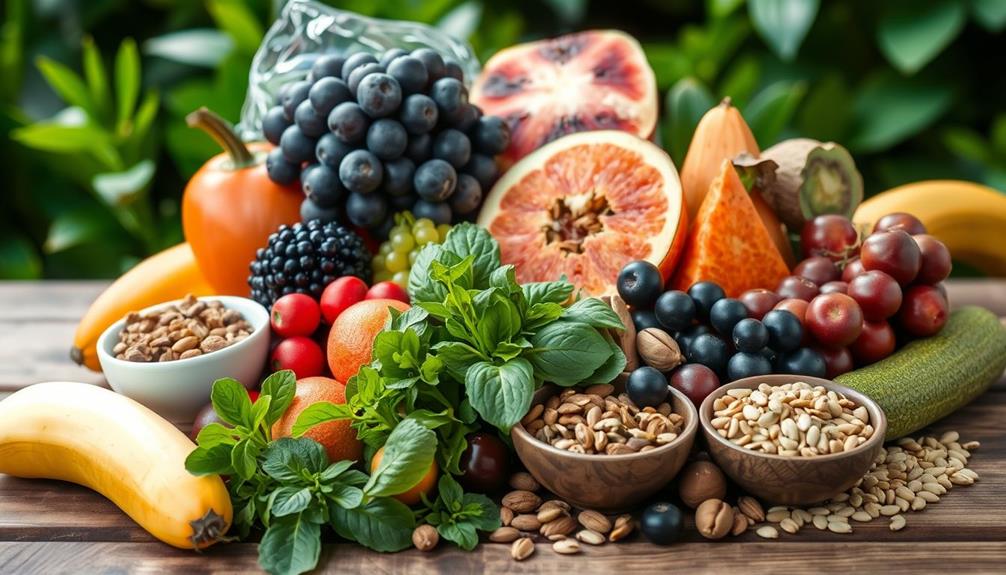
Exploring the raw food diet's potential benefits brings to light important nutritional considerations. While raw foods offer many advantages, they can lead to significant nutritional deficiencies if you're not careful. A balanced diet rich in fruits and vegetables, as emphasized in lifestyle for longevity, may not always be achieved through raw foods alone.
Here are some key points to keep in mind:
- Vitamin B12: This critical nutrient is almost exclusively found in animal products and can be lacking in a raw food diet, leading to potential deficiencies.
- Protein intake: Without cooked legumes and whole grains, your protein intake may suffer, which is imperative for muscle maintenance and repair.
- Varied diet: A diet that lacks variety can cause boredom and may make it harder to stick to your eating plan.
Moreover, cooking foods can enhance the bioavailability of certain nutrients, like lycopene in tomatoes, which you might miss out on with raw preparations.
It's important to verify you're incorporating a broad range of foods to avoid deficiencies in vitamin D, iron, calcium, and omega-3 fatty acids. In some cases, supplementation might be necessary to meet your vitamin and mineral needs.
Balancing these factors is fundamental for maintaining overall health on a raw food diet.
Risks of Raw Animal Products
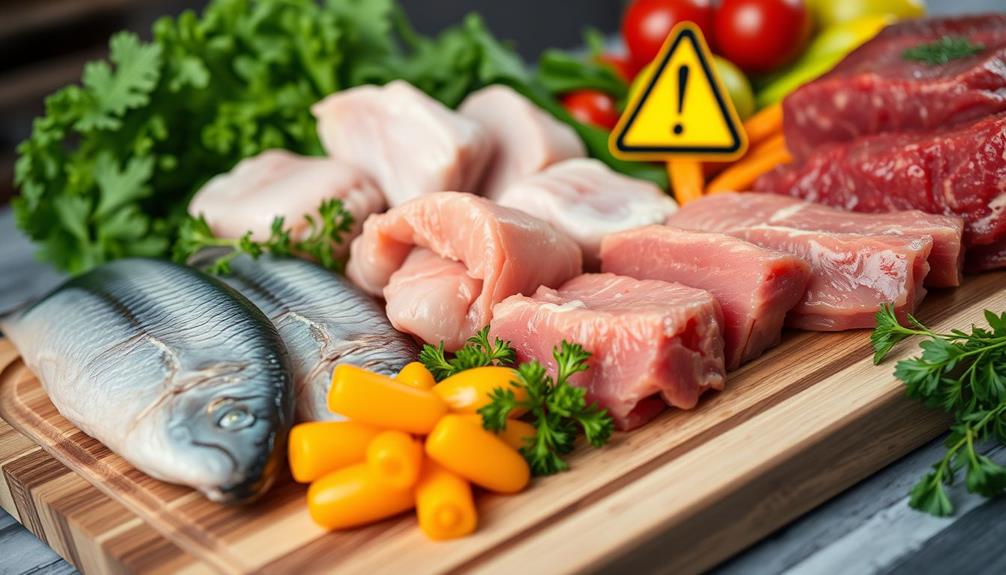
Consuming raw animal products can expose you to serious health risks stemming from harmful bacteria like E. coli and Salmonella. These bacteria thrive in foods such as unpasteurized dairy, raw eggs, and raw meats, leading to severe foodborne illness.
For instance, unpasteurized dairy products can harbor pathogens particularly dangerous for vulnerable populations, including pregnant women, children, and the elderly. Regular screening methods, such as mammography, can help detect health issues early, similarly emphasizing the importance of being proactive about food safety.
Raw eggs often contain Salmonella bacteria, which can cause gastrointestinal distress if consumed. This risk highlights the necessity of cooking eggs to eliminate any potential hazards.
Similarly, raw meats and poultry should be cooked to safe temperatures to destroy harmful microorganisms.
When you weigh the risks associated with raw animal products, they often outweigh any perceived benefits. The potential for foodborne illness is considerable, and the safety of your food should always come first.
Cooking raw animal products not only enhances flavor but also guarantees you're protecting your health and well-being. By opting for properly cooked foods, you greatly reduce your risk of encountering harmful bacteria and the serious health consequences that can follow.
Expert Opinions on Raw Diet
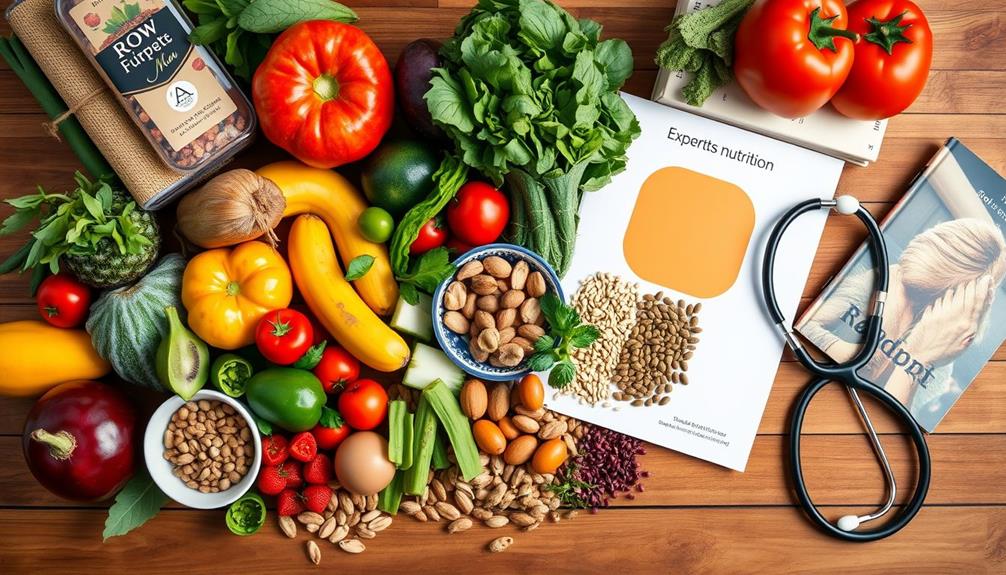
When considering a raw food diet, you should be aware of the potential nutritional deficiencies that can arise, especially in essential nutrients like vitamin B12 and iron.
Additionally, while raw foods can enhance nutrient absorption and boost immune system function, experts also point out that cooking can actually enhance the availability of certain nutrients, contradicting the belief that it always diminishes nutritional value.
For instance, the benefits of raw food include increased energy levels from natural enzymes present in raw foods.
Balancing your meals with both raw and cooked foods might be the key to achieving peak health.
Nutritional Deficiencies Concerns
How can a diet that primarily consists of raw foods lead to potential nutritional deficiencies? While raw foods can be nutrient-rich, experts warn that strictly following this diet may result in inadequate intake of essential nutrients.
For instance, many raw-foodists struggle with deficiencies in:
- Vitamin B12: A study revealed that 38% of those on a raw diet were deficient in this vital nutrient.
- Omega-3 fatty acids: These essential fats are often found in cooked fish and seeds, which may be limited in a raw diet.
- Protein: The restrictive nature of raw foods can lead to protein deficiencies, affecting muscle maintenance and overall health.
Additionally, just as with cold medications, it's important to take into account how different dietary choices can impact overall nutrient absorption.
Furthermore, cooking can enhance the bioavailability of certain nutrients, like lycopene in tomatoes, which you might miss out on when consuming only raw foods.
As a result, nutritionists advocate for a balanced approach that includes both raw and cooked foods. This way, you can guarantee thorough nutrient intake and mitigate the risks of nutritional deficiencies.
Cooking Benefits Explained
While the raw food diet has its advocates, many experts highlight the significant benefits of cooking, which can enhance nutrient absorption and safety. Cooking not only improves the bioavailability of certain nutrients like lycopene in tomatoes and beta-carotene in carrots, but it also helps break down tough plant cell walls. This makes it easier for your body to digest and absorb essential nutrients from legumes and whole grains.
Additionally, the raw food diet can lead to deficiencies in important nutrients such as vitamin B12 and omega-3 fatty acids, which are found in higher quantities in cooked animal products. Cooking also plays an important role in reducing the risk of foodborne illnesses by eliminating harmful bacteria and pathogens present in raw foods, especially in meat and dairy.
Here's a quick comparison of cooking vs. raw food:
| Aspect | Cooking Benefits | Raw Food Diet Benefits |
|---|---|---|
| Nutrient Absorption | Enhances bioavailability | Maintains some nutrients intact |
| Safety | Reduces foodborne illnesses | Freshness and enzymes |
| Nutrient Diversity | Provides a broader nutrient profile | High in vitamins and minerals |
| Convenience | Easier digestion and preparation | Quick and no cooking required |
Incorporating both cooked and raw foods can lead to better overall health.
Long-term Sustainability Challenges

Long-term sustainability challenges pose significant hurdles for those considering the raw food diet. While you may experience initial weight loss due to calorie restriction, maintaining that weight loss can be tough.
The diet's highly restrictive nature often leads to potential nutrient deficiencies that you should be aware of:
- Lack of cooked foods can result in deficiencies in vitamin B12, vitamin D, iron, calcium, and omega-3 fatty acids.
- Additionally, maintaining a balanced diet is essential for financial health, as budgeting for fresh produce can be challenging if you're not prepared for the costs of specialty items budgeting for fresh produce.
- The high time commitment for meal preparation requires advanced culinary skills, making it impractical for many.
- Social situations, like dining out, can become stressful, as strict guidelines limit your options.
These factors complicate the long-term sustainability of the raw food diet. The combination of nutrient deficiencies and the overwhelming commitment to meal prep can discourage adherence over time.
Furthermore, the restrictive nature of the diet can lead to disordered eating patterns, making it difficult to enjoy meals with family or friends. If you're considering this diet, weigh these challenges carefully to determine if it truly aligns with your lifestyle and health goals.
Practicality and Ease of Following

Following a raw food diet can be quite impractical for many individuals. This diet requires significant time and advanced culinary skills, which can be a barrier to consistency. Eating out also poses challenges, as you often need to find specialty stores for organic options. In addition, the raw food diet isn't family-friendly, especially for pregnant women or growing children, due to potential nutritional concerns.
Here's a quick overview of the practicality of the raw food diet:
| Aspect | Challenge Level | Expert Evaluation Score |
|---|---|---|
| Time Consumption | High | 1/100 |
| Culinary Skills Required | Advanced | 1/100 |
| Eating Out | Difficult | 1/100 |
| Family Suitability | Low | 1/100 |
| Food Safety Concerns | Significant | 1/100 |
Dietary Restrictions and Preferences
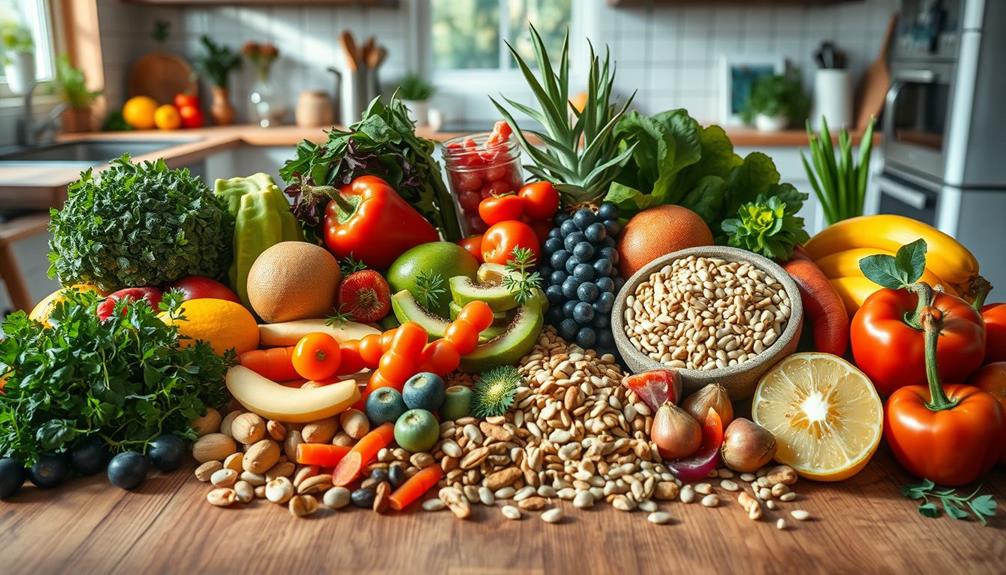
If you're a vegan or vegetarian, the raw food diet fits perfectly with your lifestyle, focusing on whole, plant-based foods.
This approach aligns with the principles of a balanced diet, emphasizing the importance of nutritional needs for overall health.
You'll find that most raw foods are naturally gluten-free, making it a great choice if you have gluten sensitivities.
However, it's vital to pay attention to your nutritional needs to guarantee you're getting a balanced diet, particularly regarding essential vitamins and minerals, as highlighted in key domains of development.
Vegan and Vegetarian Focus
The raw food diet is an appealing option for many vegetarians and vegans, as it emphasizes a variety of uncooked, unprocessed plant-based foods. This diet includes fruits, vegetables, nuts, seeds, and sprouted grains, providing a fresh and vibrant way to nourish your body.
Additionally, incorporating herbs and vital oils can enhance the nutritional benefits of your meals, such as using vital oils for respiratory health to support overall wellness.
However, if you're considering this approach, it's important to keep an eye on your nutritional needs to avoid potential nutrient deficiencies.
Here are some key nutrients to monitor:
- Vitamin B12: Often lacking in vegan diets, it's vital for nerve function and blood health.
- Iron: While plant sources are available, they may not be as easily absorbed as animal-based sources.
- Omega-3 fatty acids: Important for heart and brain health, these can be challenging to obtain from a raw vegan diet.
Consulting with a dietitian can help you tailor your raw food diet to guarantee you're meeting your vital nutrient requirements.
Gluten-Free Options Available
A raw food diet naturally lends itself to gluten-free options, making it an excellent choice for those with gluten sensitivities or celiac disease. Most raw foods are inherently gluten-free, allowing you to enjoy a variety of healthy meals without worry.
By focusing on whole, plant-based foods, you can easily incorporate gluten-free grains like quinoa, amaranth, and buckwheat when sprouted, adding diversity to your diet. Additionally, incorporating nutrient-rich ingredients like chia seeds can enhance your meals, as they offer significant health benefits and are naturally gluten-free.
Moreover, many raw recipes feature nuts and seeds, which not only provide essential nutrients but also deliver healthy fats. These foods are naturally gluten-free, ensuring you meet your dietary needs without compromising on flavor or nutrition.
While enjoying a raw food diet, it's important to monitor your nutritional balance. Make sure to include gluten-free legumes and vegetables to avoid deficiencies.
You'll find that tailoring your raw food diet to accommodate gluten-free preferences is straightforward. With so many options available, you can create a diverse and nutritious selection of foods that keep your meals exciting and satisfying.
Embracing a raw, gluten-free diet can lead to a healthier lifestyle while accommodating your dietary restrictions.
Scientific Evidence Reviewed

Research into the raw food diet reveals a complex picture of health benefits and risks. While some studies suggest potential advantages, the scientific evidence also highlights significant concerns.
For instance, while you might enjoy lower LDL cholesterol levels and a leaner body mass index, you must consider the following nutrient deficiencies:
- About 38% of raw-foodists experience vitamin B12 deficiency, essential for nerve function and blood cell production.
- Adequate protein intake can be a challenge, as plant-based sources may not provide all essential amino acids.
- Higher intake of fruits and vegetables doesn't always compensate for deficits in iron and omega-3 fatty acids, leading to further health risks.
Experts emphasize that while there are health benefits from consuming more fruits and vegetables, the risks associated with nutrient deficiencies and imbalanced macronutrient intake shouldn't be ignored.
The long-term health effects of the raw food diet remain inconclusive, indicating a need for further research. If you're considering this diet, weigh the potential benefits against the risks to guarantee you're meeting your nutritional needs.
Conclusion on Raw Food Diet

Considering the complexities of the raw food diet, it's important to weigh its overall impact on health. While it promotes increased intake of fruits and vegetables, you should be cautious. The potential for nutrient deficiencies, particularly in vitamin B12, vitamin D, iron, and omega-3 fatty acids, is significant. Experts warn that a strict raw food diet can lead to serious health risks, including foodborne illness, especially for vulnerable populations.
| Pros | Cons | Considerations |
|---|---|---|
| Increased fruit/veg intake | Nutrient deficiencies | Balance is key |
| Natural foods | Safety risks | Cooked foods can enhance nutrition |
| May boost energy levels | Advanced culinary skills needed | Practicality may suffer |
Ultimately, the raw food diet lacks scientific support for long-term benefits. Cooking destroys some nutrients, but it also makes many foods safer and more digestible. A balanced approach that incorporates both raw and cooked foods is essential for ideal health. So, if you're considering the raw food diet, think about sustainability and verify you're meeting your nutritional needs.
Frequently Asked Questions
Is a Fully Raw Diet Healthy?
A fully raw diet can offer benefits, but it also poses risks. You might miss essential nutrients and face foodborne illnesses. Balancing raw and cooked foods usually provides better nutrition and minimizes potential health issues.
Is Eating Raw Food Healthier?
Eating raw food can be healthier for you, providing essential nutrients and antioxidants. However, it's important to balance raw with cooked foods to guarantee you're getting all necessary vitamins and minerals for ideal health.
What Is the Science Behind the Raw Food Diet?
The science behind the raw food diet focuses on nutrient preservation, emphasizing uncooked foods. While it may offer benefits, it also raises concerns about deficiencies in essential nutrients, potentially affecting your overall health and wellbeing.
What Are the Negatives of the Raw Food Diet?
The raw food diet's pitfalls are staggering! You risk severe nutrient deficiencies, face potential foodborne illnesses, struggle with tedious meal prep, and might even find yourself bored and socially isolated. It's a tough path to navigate!
Conclusion
In summary, while a raw food diet can offer health benefits like increased nutrients and improved digestion, it also comes with risks, especially with raw animal products. It's essential to weigh these factors against your personal lifestyle and preferences. You might find that a balance of cooked and raw foods suits you better. Ultimately, your health journey is unique, and what works for one person might be a recipe for disaster for another—so listen to your body!

